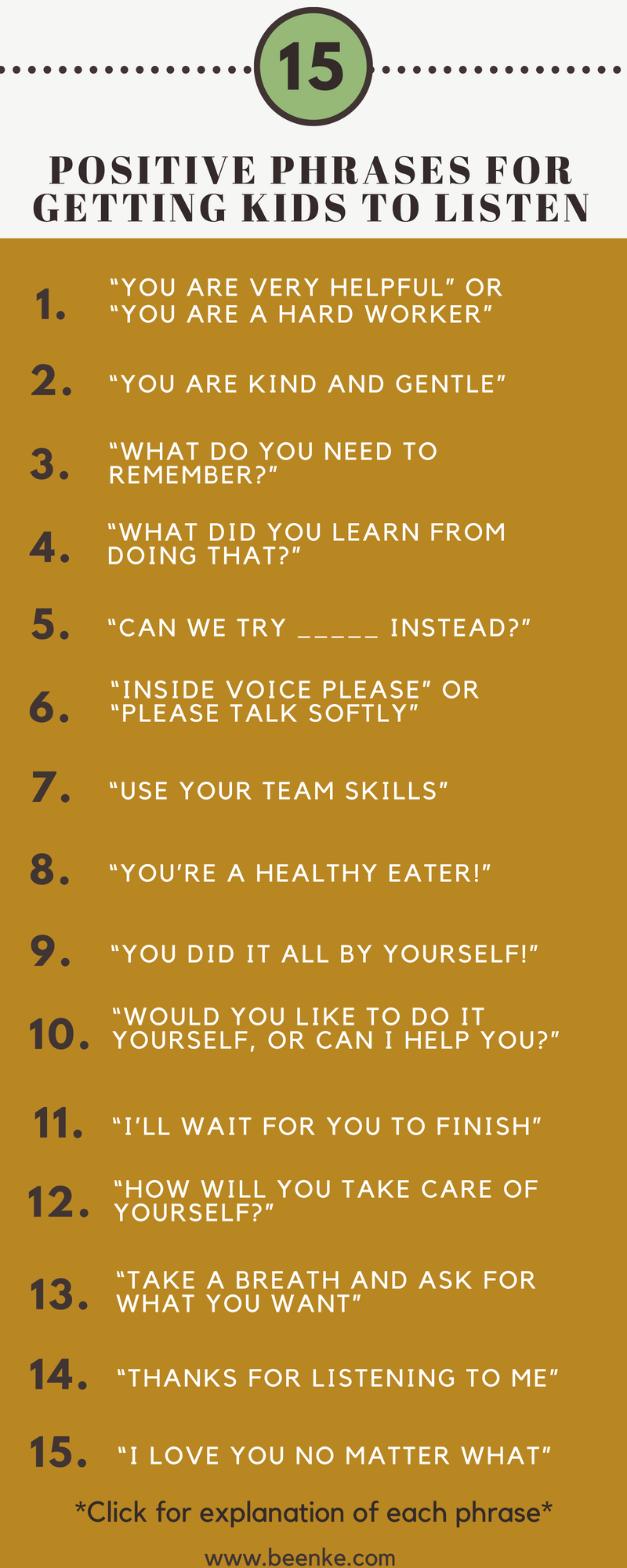I remember getting to the top of the stairs where I could still hear my son yelling about something he didn’t want to do.
I had to stop and take a few deep breaths because I’d reached my edge. At this point, I was about to lose it, and I didn’t want to do something I’d later regret.
One breath, two breaths…keep it together. This too shall pass. But let me tell you, getting kids to listen is NO EASY TASK!
I’d tried my best tricks; eye contact, comforting gestures, getting down to his level…but on this particular day my son wasn’t having it. Today he was just not listening.
He’s a very high energy kid who likes to explore the world by doing things like jumping off furniture, crashing objects together, or smearing whatever substance is on his hands all over the house.
Related: How To Be a Better Mom: 7 Ways To Be more Patient
As I stood on the stairs trying to calm myself down, I knew I had to find a better way to communicate with my child.
Getting kids to listen is a skill. And like any other skill, it can be improved with patience and practice.
Set Reasonable Expectations
One important thing to remember is that a child’s brain isn’t yet fully developed. This includes their ability to listen and follow instructions.
I had to remind myself that my toddler wasn’t “out to get me”, he was doing the best he could given the situation and his development level.
For a point of reference, an average 2-year old will comply with instructions 60% of the time. A 3-year old will follow directions about 70% of the time.
Reality check; if you’re getting kids to listen a little more than half of the time, you’re actually doing pretty darn well.
From a developmental standard that’s totally “normal”.
Remembering this helps get me through some of the more challenging parenting days.
Related: Top 12 Ways To Improve Your Parenting Skills Today
Another tip I picked up on my quest to learn how to talk so kids will listen is the way you speak matters! Children reflect back what they hear from us.
If I’m frustrated, yelling, or impatient – my child tends to respond in kind.
So when I really need my son to follow directions, I switch to a more neutral, calm, direct and encouraging tone of voice. Which gets much better results.
I also researched positive parenting phrases I can use that are specifically designed for getting kids to listen.
Using these phrases can help make a conversation go more smoothly and increase the likelihood your kids will actually hear and process what you have to say.

15 Positive Phrases For Getting Kids To Listen
1. “You Are Very Helpful” or “You Are A Hard Worker”
These are great phrases to let your child know they are doing a good job without saying “good job” or “good boy”, which are too vague to have an impact.
These phrases reinforce good behavior by putting kids in the mindset to help others, or be reinforcing that effort is important.
2. “You Are Kind And Gentle”
Reminding little ones that they are kind and gentle helps, especially if they’re in the hitting, throwing, or kicking phase.
You can also say “show me how to be kind and gentle” if your child is handling something too roughly.
This phrase helps kids monitor their physical actions.
3. “What Do You Need To Remember?”
We use this phrase in place of “be careful”, which is another ‘too vague to be helpful’ phrase.
By asking a question, you’re getting your child to use their thinking skills and take some accountability for their behavior.
“What do you need to remember when crossing the street?”
Phrasing it this way gets kids thinking about all the things you’ve told them before; look both ways, hold an adult’s hand, wait for the light to turn green, etc.
Also In Beenke: End The Power Struggle! Top 6 Ways To Get Kids To Cooperate
If they can’t remember the specifics, then it’s also a great chance to gently remind them of what you expect.
4. “What Did You Learn From Doing That?”
This is a better way to approach a mistake then “you should know better” or “shame on you”.
You’ll get your child thinking about the future and how they can do better next time, rather than feeling bad about what they did in the past.
5. “Can We Try _____ Instead?”
When working on getting kids to listen, especially if they’re doing a behavior you don’t approve of, it helps to focus on what you’d like them to do instead.
If you’re child is climbing on the table, for example, you can say “can we try sitting in the chair instead?”
6. “Inside Voice Please” or “Please Talk Softly”
Say these phrases in a low voice instead of yelling “be quiet!” or “stop screaming!”.
Some kids have a really hard time controlling the volume of their voice. By focusing on what they should do, talk softly, and showing them how…by lowering your own voice, you increase your chances of getting kids to listen.
7. “Use Your Team Skills”
This phrase can replace things like “don’t be mean!” or “don’t act bossy!”
Some kids have a tendency to want to take charge, not necessarily a bad thing, but if they’re told they’re too bossy or mean it could damage their self esteem and make them shut down.
Plus other kids may not want to play with them if they’re always taking over.
Instead, coach them on how to use “team skills”. Talk to your child about taking turns, letting other kids lead, and not telling everyone what to do all the time.
Then when you gently remind then to use their “team skills”, they’ll know what you mean without being embarrassed.
8. “You’re a Healthy Eater!”
Lots of battles with our kids, especially when they’re younger, are over getting them to eat certain foods.
If you tell a child you’re a “picky eater” they’ll just internalize that label and turn their nose up at even more food.
But if you instead call them a “healthy eater”, they may be encouraged to try branching out and eating something new.
Also In Beenke: Positive Discipline: Parent With Love Not Fear
9. “You Did It All By Yourself!”
All toddlers desire mastery over new skills. This is a great phrase to encourage independence.
When your child does something on their own, like getting dressed, recognize them for their efforts.
It’ll give them a boost of self confidence!
10. “Would You Like To Do It Yourself, Or Can I Help You?”
This is instead of yelling something like “do it now!” or “you better do it or else!”.
Kids are known to lollygag, particularly if you’re in a hurry. The tend to respond much better if they feel like they have some control over their situation.
By offering a choice, “do you want to put on your socks yourself or have me do it?” You child’s thinking skills will override their initial reaction to push back.
11. “I’ll Wait For You To Finish”
This is a hard one for us parents to do. Believe me, I know.
But sometimes we’re the ones that need to take a chill pill and give the kids a few extra minutes to make a transition or get ready.
If you always swoop in a finish a task for your kids, “here, let me do that for you”, they’ll never learn to do it themselves.
12. “How Will You Take Care Of Yourself?”
If your child is dealing with an emotional situation, sometimes asking them how they will take care of themselves puts them in the mindset of managing their own feelings.
Your child will start to think about things they can do to feel better and calm down.
13. “Take a Breath and Ask For What You Want”
Use this phrase to replace the ever-popular but unhelpful “stop whining!”
Be sure to use a calm, direct voice when addressing your child, as they’ll tend to copy you.
In this way you’re helping them transition from a whiny voice to calmer, more direct ask for what they actually want.
14. “Thanks For Listening To Me”
If you’re working on getting kids to listen, and they do…then thank them for their efforts!
Many children thrive on positive affirmations. When they’re paying attention, give them some reassurance that they’re doing the right thing.
Also In Beenke: How To Raise Grateful Kids In An Overly Entitled World
15. “I Love You No Matter What”
The core of positive parenting is unconditional love.
When kids feel safe and secure in the knowledge their parents love them, no matter what, they are more apt to listen and follow our instructions.
Remind them often! Demonstrating affection builds connection which is at the heart of getting kids to listen.

SHARE these 15 positive phrases for getting kids to listen on Facebook and Pinterest by clicking the buttons below.












